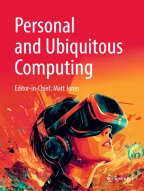Abstract
The adoption patterns for new technology such as mobile services are essential to understand for developing them further. Hence, it is important to study how willing people are to try new mobile services and do variables, which facilitate the use of the services have an effect on the consumers’ perceptions of the services and their adoption readiness. This study analyses how the familiarity of mobile devices, the time the services are initially used and users’ technology skills affect the initial mobile service usage experience and the likelihood of continuous usage. The results show that the duration of the use does not effect consumers’ perceptions about mobile services, but familiarity of the device and user skills have an impact on the perceptions of the services.
Similar content being viewed by others
References
Tarasewich P, Nickerson RC, Warkenti M (2002) Issues in mobile e-commerce. Commun Assoc Inform Sys 8:41–64
Balasubramanian S, Peterson RA, Jarvenpaa SL (2002) exploring the implications of m-commerce for markets and marketing. Acad Mark Sci 30(4):348–362
Shim JP, Shim JM (2003) M-commerce around the world: mobile services and applications in Japan, Korea, Hong Kong, Finland and the US. Decision Line September/October
Aarnio J, Enkenberg A, Heikkilä J, Hirvola S (2002) Adoption and use of mobile services empirical evidence from a finnish survey. Proceedings of the 35th annual Hawaii international conference on system sciences. Hawaii
Bruner II GC, Kumar A (2005) Explaining consumer acceptance of handheld Internet devices. J Bus Res 58:553–558
Green N, Harper RHR, Murtagh G, Cooper G (2001) Configuring the mobile user.Sociological and Industry Views. Personal Ubiquitous Computing 5:146–156
Han S (2002) A framework for understanding adoption and diffusion processes for m-commerce products and services and its potential implications for planning industry foresight. Conference paper IRIS25 August, Falkenberg, Sweden
Pedersen PE, Methlie LB, Thorbjornsen H (2002) Understanding mobile commerce end-user adoption: a triangulation perspective and suggestions for an exploratory service evaluation framework. Proceedings of the 35th Hawaii internation conference on system sciences, Hawaii
Ajzen I, Fishbein M (1977) Attitude–behavior relations: a theoretical analysis and review of empirical research. Psychol Bull 84:5
Davis FD (1989) Perceived usefulness, perceived easy of use and User acceptance of information technology. MIS Q 319–340
Rogers EM (1995) Diffusion of innovations. The Free Press, New York
Venkatesh W, Morris MG, Davis GB, Davis FD (2003) User acceptance of information technology: toward a unified view. MIS Q 27(3):425–478
Rosen PA (2004) The effect of personal innovativeness in the domain of information technology on the acceptance and use of technology. A working paper 2004
Schaper L, Perven G (2004) A model of information and communication technology acceptance and utilisation by occupational therapist. Decision support in an uncertain and complex world: the IFIP TC8/WG8.3 international conference
Mallat N (2004) Theoretical constructs of mobile payment adoption. Conference paper, IRIS27 August 14–17, Falkenberg
Anderson JE, Schwger PH (2004) SME Adoption of wireless LAN technology: applying the UTAUT model. Proceedings of the 7th annual conference of the southern association for information systems
Acknowledgments
The financial support of National Technology Agency of Finland and the industrial partners of Rotuaari project were gratefully acknowledged.
Author information
Authors and Affiliations
Corresponding author
Rights and permissions
About this article
Cite this article
Koivumäki, T., Ristola, A. & Kesti, M. The perceptions towards mobile services: an empirical analysis of the role of use facilitators. Pers Ubiquit Comput 12, 67–75 (2008). https://doi.org/10.1007/s00779-006-0128-x
Received:
Accepted:
Published:
Issue Date:
DOI: https://doi.org/10.1007/s00779-006-0128-x
